I was at my local pub on Saturday just trying to have a nice time after a bad week. Trying to be hopeful and enjoy my new George Michael homage t-shirt. Things of that nature. While at said local, I got talking to someone else who claimed to also be a regular (lol, FALSE) and we had a nice time discussing NWA and Tupac. But then he started to ask me if I had kids. I said no, and then for half an hour he proceeded to tell me why I should have them, as I repeatedly stated that I have absolutely no interest at all whatsoever in being a parent. Ever. Anyway, I am sensitive to how cultural hegemony works and why people say these types of things, but that guy was on my mind when I made the mistake of logging on and saw two things making the rounds.
One was a terrible TER ex-Olympian making gross homophobic comments like this:

The other was a person with an Instagram account called momlife comics, who posts stuff like this:
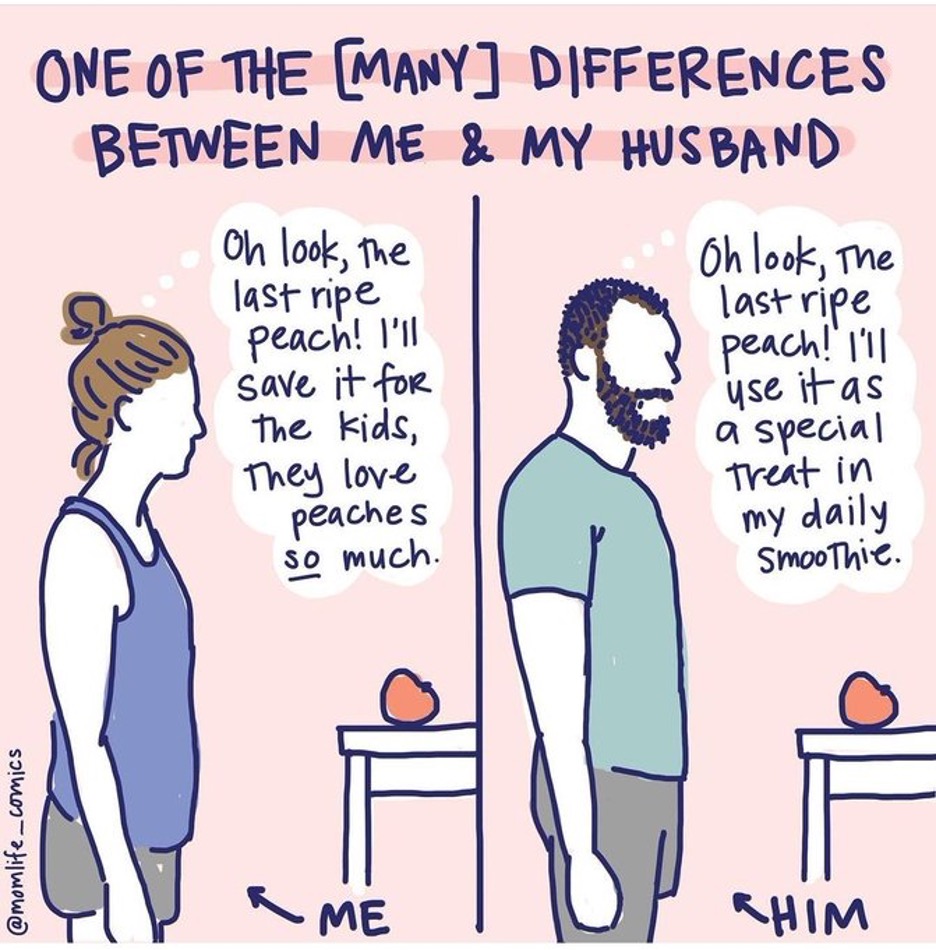

Anyway, this is all very interesting to me because, well, this understanding of womanhood – as expressly linked to procreation and drudge work – has been around for an incredibly long time. Indeed, it is treated in one of my favourite medieval sources “A Letter on Virginity for the Encouragement of Virgins”. It’s a thirteenth-century English document that was written to make the argument that women should not marry, and instead ideally join the Church. The whole “join the Church and never have sex” part of the document has rather fallen out of cultural favour. The idea that if you never have sex that “the king of all kings will desire you as a lover”[1] and you will therefore be married to Jesus in heaven doesn’t really get passed around so much anymore. Sure, you have a lot of weird Christian pressure groups that will do creepy stuff like purity balls and all that nonsense, but you don’t have so much harping on about the necessity of sexual abstinence until death as the ideal for the majority of women.
Gone too is the supposition that the main reason women get married is “to cool [their] lust by the defilement of [their] body, to satisfy [their] carnal desire through intercourse with a man” a tendency which is so awful it is “disgusting to think about it, and even more disgusting to talk about it”.[2] This, of course, accords perfectly with the idea that women were unstoppable sex machines which prevailed until later into the modern period, as I will never tire of telling you. However, we have now discarded this notion in favour of the idea that women deign to have sex with men not out of enjoyment of sex itself, but in an attempt to form a pair bond and have children – the ultimate goal for any woman and indeed her reason for existing.
Well the Letter saw that idea coming, and what I love so much about it is the fact that is wants married women to consider that “[n]ow you are married, and have descended so low from so high – from the likeness of angels, from the beloved of Jesus Christ, from a lady in heaven, into carnal filth, into the life of an animal, into servitude to a man, and into the world’s misery”.[3] There it is – servitude to a man. Sure, you might enjoy having kids and all that, but ultimately “whatever advantage or happiness comes of it, it is too dearly bought”.[4]
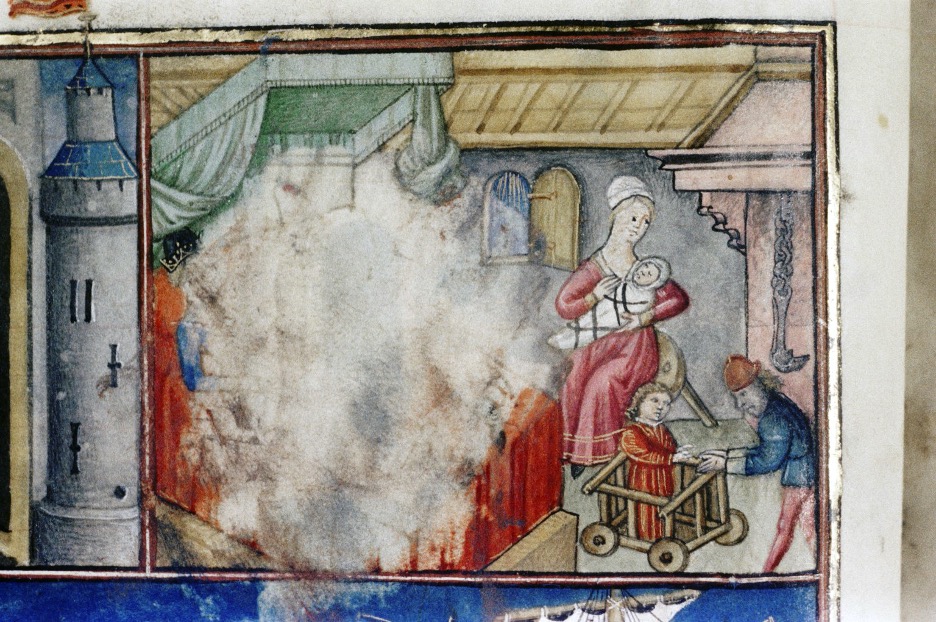
Why is that? Well, the reasons are several. First, there is the fact that you lose out on marrying JC in heaven and all the fun that comes with that. Second, you have to have sex, which the Letter is pretty convinced is gross (see above), and even more sure that you aren’t going to like. But most importantly for this blog, the letter, like the momlife comics and the TER, focuses on domestic and reproductive labour and the hegemonic idea that this is something that women absolutely will experience.
One way it does this is by asking its readers to reflect upon the physical realities of pregnancy and childbirth. Consider, for example the woman who “has all she wanted in the child that she longs for, and let us see what happiness she gets in it. … in carrying it there is heaviness and constant discomfort; in giving birth to it, the cruelest of all pains, and sometimes death; in bringing it up, many weary hours. As soon as it comes into this life, it brings more anxiety with it than joy, especially to the mother.”[5] The Letter focuses on the actual pain that occurs both during labour and pregnancy which “bulges you out like a water skin” gives you “stitches in your side, and often painful backache; heaviness in every limb; the dragging weight of your two breasts, and the streams of milk that run from them.”[6] So far, so like the TER Olympian, no?
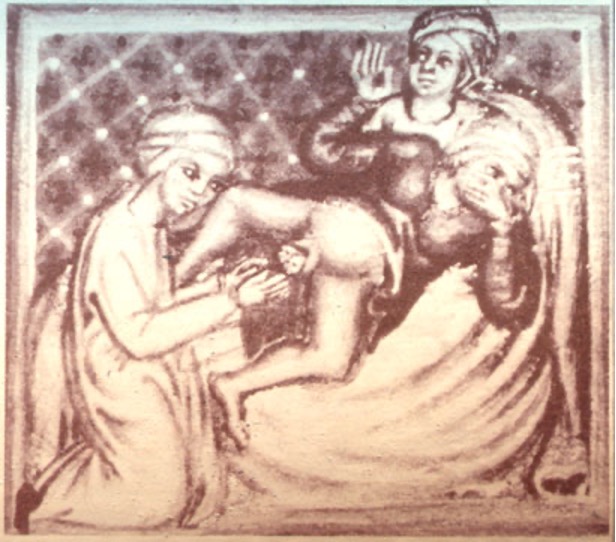
Meanwhile, the Letter begs you to consider that after your body has been kicked around, you will also be looking at a life of on-going and grinding domestic work. Even if you have a husband who is taking care of the bills, there will still be numbing amounts of work to do, and “[s]upported by a man, you will suffer cruelly for his sake and the world’s, since neither can be relied on; and lie awake with many cares and be more oppressed than any drudge in the house or any hired servant; and often acquire your own share with suffering and pay dearly for it.”[7] The trouble, or course, starts with looking after infants who “will keep you up in the middle of the night” and who leave “filth in the cradle, and in your lap sometimes” and there will be “many weary hours in feeding and rearing it”. Moreover, there is an on-going sense of anxiety surrounding the life of one’s child itself. This leaves mothers “anticipating after all this time when it will go astray and bring all kinds of unhappiness to its mother.”[8]
If you are enjoying this post, why not support the blog by subscribing to the Patreon, from as little as £ 1 per month? It keeps the blog going, and you also get extra content. If not, that is chill too.
But, of course, domestic labour doesn’t begin and end with childcare. The Letter insists that you need to consider “what kind of position the wife is in who, when she comes in, hears her child screaming, sees the cat at the filtch and the dog at the hide, her loaf burning on the hearth and her calf sucking, the pot boiling over into the fire – and her husband is complaining?”[9] This right here could essentially be a momlife comic. You know – all those chores that women do while a useless man sits there and does nothing? Oh ho ho so relatable.
So, the Letter seems to actually line up exactly with both of these pieces of media, but there is a crucial difference – the Letter does not treat the state of motherhood as inevitable for all women. Both momlife and the TER do. The entire point of the Letter is that women have options. Yes, most people are going to tell you that you need to get married and have children, and most women will, but that doesn’t mean you have to do so. Instead, it stresses that “[a] virgin knows little of all this misery”[10] and that while no one will tell you so, when it comes to motherhood “misery exceeds the happiness, and the loss universally exceeds the gain”.[11]
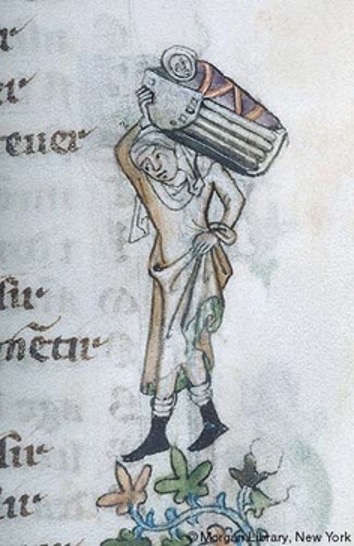
And that is what I like about the Letter – it is a document that examines the gendered nature of parenting in its society and finds it wanting. There are so few documents, whether medieval or modern, that truly critique the idea of motherhood as inevitable, or even really are honest with women about that experience. The momlife comics and the homophobic tweet talk about how the gendered nature of parenting sucks, but they treat it like it is a monolith. There is absolutely no other way the world could be. There are no other options for women. It was always going to be this way.
This is not to say that the Letter has nothing in common with the other media. Far from it. All of these are shot through with heteropessimism – a term which describes the “pervasive disappointment, ambivalence, if not doubt, about the quality of the lived heterosexual experience.”[12] Heteropessimism looks at the way that relationships like these function and the weight of domestic labour being put on women, and assumes that this is the only way things can be. Mums will always be “rushing out a wholesome dinner and doing the laundry”, or being the only one packing for the children on an outing out of the house, because men simply are incapable of doing either thing. The Letter concurs with this. It believes that the only way to avoid such pain and drudgery is to avoid relationships and sex altogether.
This is where the Letter and I have to part ways. I absolutely value it for talking about the unspeakable. I firmly believe that a focus on the pain involved in pregnancy and childbirth is super useful! As is reminding women that romantic ideas about a marriage – an institute which exists by and large as a property contract – are probably unfounded. However, I don’t believe in heteropessimism as a whole. Did you know, for example, that some men don’t just fucking suck? It’s true! I, for example, had a kick ass dad who was cooking dinner, doing the laundry, helping us with homework, and just generally being super involved around the house because my mum had to commute and always got home late. (Hi mum and dad! I love you!) And did you know that when you are dating men it is actually possible to just sort of, you know, observe their domestic habits and then – and this is crucial – not fucking have kids with them if they don’t pull their weight. We have such a leg up on medieval women here because you can even cohabitate before you marry a guy and test this out and then dump his ass if he sucks. Moreover, if you are with such an incredibly dud partner that he doesn’t help around the house ever, we now have the ability to divorce them. As Da Share Zone says “Just walk out you can leave!!” Any guy who doesn’t do anything around the house isn’t a loss anyway, so hit da bricks.

To be fair to the momlife lady, I think a lot of the criticism levelled at her is just plain old repackaged misogyny and it seems misplaced to me. After all, she is trying to vent about how her life is hell because she got tricked by an incredibly strong hegemonic narrative. This is a societal failing as much as anything, and to a certain extent I think that media like this – even though it is incredibly cringe inducing – is perhaps useful in that it at least lifts back the veil on the realities of domestic reproduction. Having said that, its insistence that this is just how “momlife” must be is misguided at best.
All of which brings me to my final point – women don’t actually have to be defined by our capacity as wives and mothers. Don’t want to run around after kids and cook all your life? Then … don’t? Lord knows that I would be really bloody miserable if I had to parent all the time as well. So, I don’t. It is not, in fact, an immutable facet of femininity that you have a miserable time surrounded by children. This isn’t the thing about women. Not doing it doesn’t necessarily make your life incomplete or you not a woman.
However if you go down my route it does mean that sometimes some guy in a pub is going to take exception to your life choices at times. Sure. But you know what? I can be in the pub at 11 pm on a Saturday having that conversation because I don’t have kids and do what I want. More to the point, if you feel like you have to take the advice of every person you speak to down the pub then you probably have bigger issues going on in your life. Maybe work on those instead of hating your husband in public or being a giant homophobe. Just an idea!
The images in this piece I found in an incredible resource – Professor Sarah Peverly’s blog – where she has a whole raft of images containing medieval babies. Check it out!
[1] Bella Millet and Jocelyn Wogan-Browne (eds.), Medieval English Prose for Women: From the Katherine Group and Ancrene Wisse, (Oxford: Clarendon Press, 1990), p. 9.
[2] Ibid., p. 23.
[3] Ibid., p. 22.
[4] Ibid., p. 25.
[5] Ibid., p. 31.
[6] Ibid., pp. 31, 33.
[7] Ibid,, pp. 25, 27.
[8] Ibid., p. 33.
[9] Ibid., p. 35.
[10] Ibid., p. 33.
[11] Ibid., p. 35.
[12] “What is ‘heteropessimism’ and why do men and women suffer from it?”, The Conversation, 28 June, 2022. https://theconversation.com/what-is-heteropessimism-and-why-do-men-and-women-suffer-from-it-182288 <Accessed 1 August 2022>.
For more on gendered expectations in the medieval period, see:
On conflating drag (and femininity) with sexuality
On women and semen
On sex, logic, and being the subject
On “alpha men”, sexual contagion, and poorly disguised misogyny
On disavowing sexual assault
On women and desire
Support the blog by subscribing to the Patreon, from as little as £ 1 per month! It’s the cool thing to do!
My book, The Once And Future Sex: Going Medieval on Women’s Roles in Society, is out now.

© Eleanor Janega, 2024

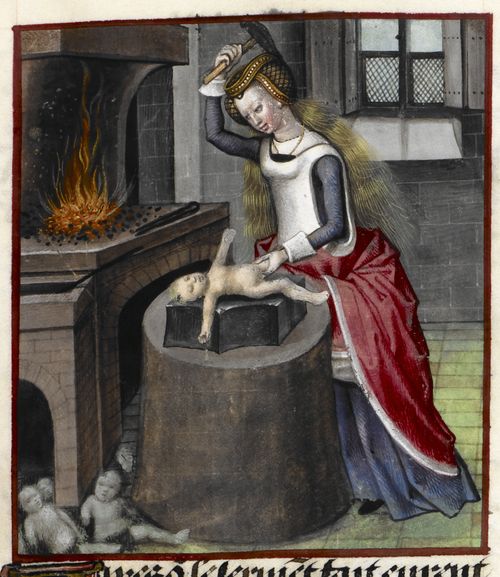
I’m not hip to the latest lingo and Da Googles let me down. TER?
Totally agree with the ‘do your own thing’. Kids ain’t for everyone.
LikeLike
Look up “TERF”. I imagine Dr. Janega doesn’t wish to honor such people with the label of “feminist”. (I agree.)
LikeLike
Correct!
LikeLike
I think TER is TERF without the F since those people aren’t actually feminists.
LikeLike
That’s right.
LikeLike
Dr. Janega, may I suggest retconning “Trans Excluding Reactionaries” for TER? In any case, I’ve just passed along your usage to a lobbyist for abortion rights.
LikeLike
You were so much more polite to that fool than I would have been.
LikeLike
Well, dying in first childbirth could spare you the alleged horrors of a medieval motherhood, but somebody had to rear those surviving children. Presumably there were enough volunteers to keep the world populated. Also, I guess a lot of men were servants of one sort of another, so I am not clear what distinction the Letter makes in condemning servitude. And were not orphanages commonly run by the Church? Join the Church to avoid the drudgery of motherhood and servitude to a man, and be put to work in an orphanage run by some guy? Maybe this Letter was something medieval women would drop in the fire as soon as they received it. Medieval spam.
LikeLike
It’s unlikely they read it themselves, to be honest. It was more probably that it was preached to them.
LikeLike
Indeed. I read something recently about secret schools teaching forbidden literacy, perhaps it was underground girls’ schools in Taliban Afghanistan, and a version of the Sorcerer’s Apprentice where the boy, turned down for being literate, re-presents himself as illiterate to get the job. Is there any evidence for such subversive literacy in medieval times?
LikeLike
The momlife lady has gone on the record that her husband makes a lot of contributions to the household and she is exaggerating his uselessness for comic effect. Still, the fact that there’s enough of an audience for this kind of comedy that momlife is able to make it her Brand means that heteropessimism is going to take a while to die.
LikeLike
Yeah I completely agree. It is playing into heteropessimism even if it is not a factual reporting of things on the ground.
LikeLike
This is unrelated to this very good article but I hadn’t seen that Share Zone meme before and it partially influenced me to quit my terrible job this week. I’m going back to school and was on the fence about quitting. Then my coworker was nasty to me and my brain reminded me Just Walk Out, You Can Leave! I handed in notice.
LikeLike
HELL YEAH! WORK! … IF IT SUCKS HIT DA BRICKS! Love this for you.
LikeLike
I feel there is another option that is underrepresented in this article. Sure, if you don’t want to raise children, please don’t have them. And that goes for men, too. But if you do want to raise children, but you both hate dirty dishes as well as doing them (dishes, that is), there may be a way …
I guess here we are somewhat familiar with role expectations. And we tend to yield to those. We also tend to do dishes if we hate those dirty plates cluttering the place. If that makes you love your partner less, please try to withstand the pressure to do the dishes. Instead talk, fight – communicate.
We all have expectations and preferences and we have different levels of tolerance with regards to aberrations from these expectations and preferences. The one with the lowest tolerance is not doomed to yield. It may be that females are at a disadvantage here because tolerances and role expectation both tend to play against them in our culture. A fair partnership should ideally be able to make up for that disadvantage. But a compromise may also include dirty dishes.
Okay, I feel that was rather cryptic. Figure out what you want, what your partner wants and what the child needs. There is a huge spectrum there that may deviate wildly from your parental or ideal home. Figure something out that all involved can flourish in and figure out a way to get there to-freaking-gether.
LikeLike